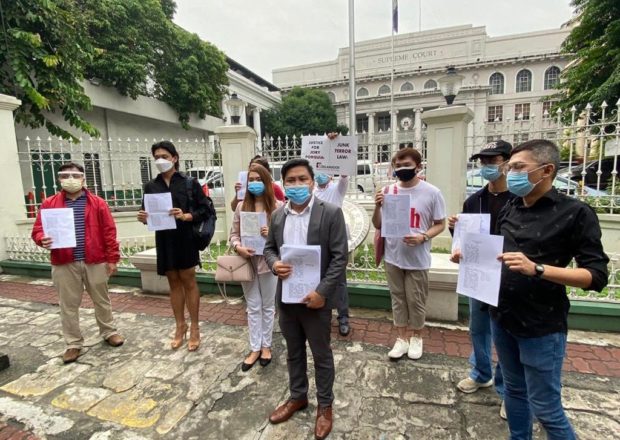
Concerned Online Citizens composed of bloggers, social media influencers, and other internet personalities join the call for the Supreme Court to junk the Anti-Terrorism Act of 2020. Photo by JUCRA pool
MANILA, Philippines — Bloggers, social media influencers, and other internet personalities have joined the call to declare several provisions of Republic Act 11479 or the Anti-Terrorism Act of 2020 (ATA) unconstitutional.
The 21st petition against the controversial law was filed before the Supreme Court by Mark Averilla or Macoy Dubs, Marita Dinglasan also known as Aling Marie, Jover Laurio of Pinoy Ako Blog, blogger and columnist Tonyo Cruz, former lawmaker turned blogger Mong Palatino, mental health advocate Dr. Gia Sison, Ian Porquia of Reklamador Facebook Page, Mindanao blogging community pioneer Blogie Robillo, and 11 others collectively known as “Concerned Online Citizens.”
“The Philippines, including our portion of the internet, must be free,” the petitioners, through their lawyer Rodel Taton, Dean of San Sebastian College of Graduate School of Law, said.
“We are reminded that our rights, whether offline or online, should be protected,” they added.
The petition, according to Taton, touches on the vulnerability and susceptibility of Filipinos, who are online mostly in social media, to become victims of the new law’s vague definition of terrorism and acts of terror.
“One can easily be tagged as a terrorist or terrorist sympathizer, or terrorist enabler and anyone may be subjected to surveillance, attack and even to peddled fake and false news against their persons,” he pointed out.
Similar to the other petitions, they want the high court to nullify the following provisions for being unconstitutional:
Section 4 – definition of Terrorism;
Section 5 – threat to commit terrorism;
Section 6 – planning, training, preparing and facilitating the commission of terrorism;
Section 9 – inciting to commit terrorism;
Section 10 – recruitment to and membership in a terrorist organization;
Section 11 – foreign terrorist;
Section 12 – providing material support to terrorists;
Section 25 – designation of terrorist individual, groups of persons, organizations or associations;
Section 26 – proscription of terrorist organizations, associations or group of persons;
Section 27 – preliminary order of proscription; and
Section 29 – detention without judicial warrant of arrest
Concerned Online Citizens composed of bloggers, social media influencers, and other internet personalities join the call for the Supreme Court to junk the Anti-Terrorism Act of 2020. Photo by JUCRA pool
“It cannot be overly emphasized that the new Anti-Terrorism Act is highly questionable for its vague and overbroad definition of ‘terrorism’, which may lead to the capricious and arbitrary application by law enforcers and may chill the people to silence,” the petitioners said.
They added that the vagueness of the new anti-terror law poses the danger of curtailing the people’s fundamental freedoms of speech, expression, and assembly as well as the freedom of the press since this will discourage citizens from airing their opinions on sensitive political and social issues for fear of violating the law.
The petitioners are also asking the Supreme Court to issue a temporary restraining order (TRO) pending its action on the merit of the petition.
The TRO is necessary, according to the petitioners, as the implementation of the ATA causes grave and irreparable damage and injury on anyone whose constitutionally guaranteed rights to exercise freedom of speech, expression, and assembly as well as freedom of the press shall be restrained or impaired.
“This is a fight for and on behalf of 73 million online Filipinos. If we do not fight and if the court won’t take action, the terror law could easily be used to stifle Internet freedom in the guise of fighting terror. The government has been using the Cybercrime Law before to silence critics, even ordinary citizens. The terror law is the new weapon of a tyrannical government,” petitioners said.